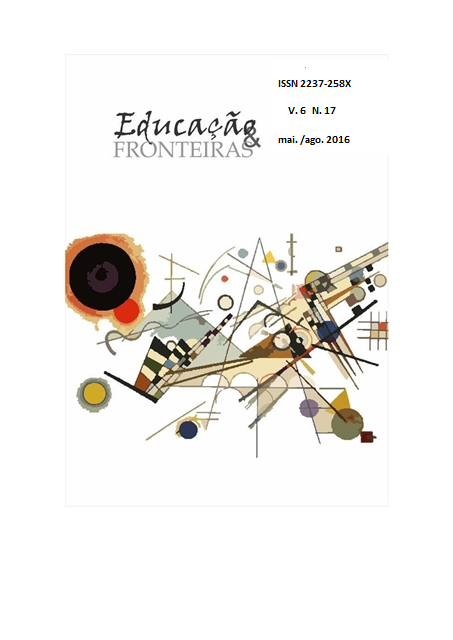Thinking objects in teaching by means of Foucault's studies
Keywords:
Objects in education. Discourses. Technologies. Foucaultian studies.Abstract
This article aims to show how the studies of Michel Foucault, taken as a theoretical and methodological principles can help to understand the ways in which objects have been thought in the discourses setting out its importance in education, considering the relationship between power and knowledge that permeate these discourses. Seeking to achieve this goal, we discuss in this paper some concepts handled by Michel Foucault, relating them to the central focus of our studies: the use of objects in the classroom, and the thinking around this use, considering both the old and the new technologies, which they enter the school environment from the concern with the quality and innovation of school practices. By the results and discussion, highlighting the discourses, we see the need to consider the diversity of the same, where they are produced, the situational contexts in which they are born, the people who produce them, and the "truths" that are built in around that object and its use. The approach of the theoretical reference to the object of our study allows us to observe that the introduction of any technology in school should be discussed also in the context of discourses that legitimize their use, and the way they are appropriate for school subject.Downloads
References
CARNEIRO, Vera Clotilde. Pesquisa foucaultiana: uma alternativa entre os caminhos alternativos. Revista Educação, Porto Alegre, n.41, p.181-202, 2001.
FISCARELLI, Rosilene Batista de Oliveira. Material didático: discursos e saberes. Araraquara: Junqueira e Marin Editores, 2008.
FISCHER, Rosa Maria. Foucault e a análise do discurso em educação. Cadernos de pesquisa, nº. 114, 2001, p.197-223.
FOUCAULT, Michel. Microfísica do poder. Rio de Janeiro: Edições Graal, 1979.
__________. A arqueologia do saber. Rio de Janeiro: Forense, 1986.
__________. As palavras e as coisas. São Paulo: Martins Fontes, 2000.
__________. História da sexualidade: a vontade de saber. Rio de Janeiro: Edições Graal, 2003.
__________. Arqueologia das Ciências e História dos Sistemas de Pensamento. Rio de Janeiro: Forense Universitária, 2005.
GASPAR, Nádea Regina. Foucault nas visibilidades enunciativas. In: SARGENTINI, Vanice e NAVARRO-BARBOSA, Pedro. (Orgs.). Michel Foucault e os domínios da linguagem: discurso, poder, subjetividade. São Carlos: Clara Luz, 2004, p.231-260.
KENSKI, Vani Moreira. Educação e Tecnologias: o novo ritmo da informação. Campinas, SP: Papirus, 2007.
MARSHALL, James. Governamentalidade e Educação liberal. In: SILVA, Tomás Tadeu. (Org.) O sujeito da educação: estudos foucaultianos. Petrópolis, RJ: Editora Vozes, 2002. p.21-34.
POPKEWITZ, Thomas S. Reforma Educacional: uma política sociológica. Porto Alegre: artes Médicas, 1997.
SOUZA, Rosa Fátima de. Objetos de ensino: a renovação pedagógica e material da escola primária no Brasil, no século XX. Educar em Revista, Curitiba, Brasil, n.49, p.103-120, jul/set. 2013. Editora UFPR.
VEIGA-NETO, Alfredo. Foucault & Educação. Belo Horizonte: Autêntica, 2004









